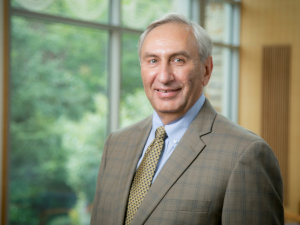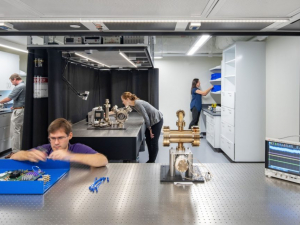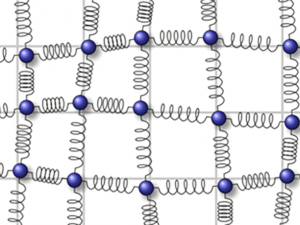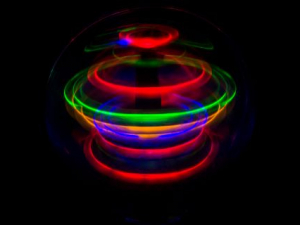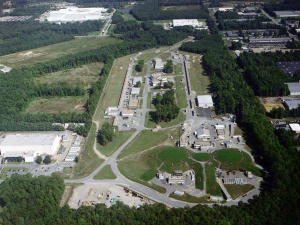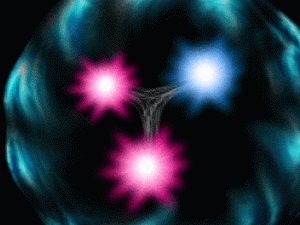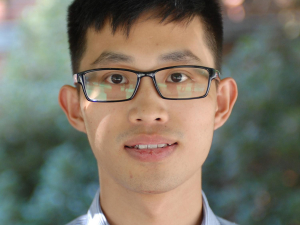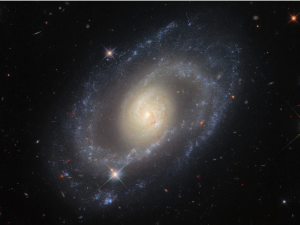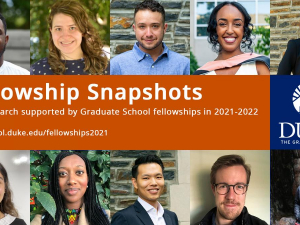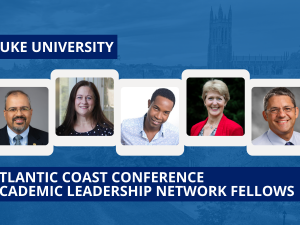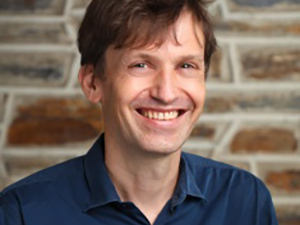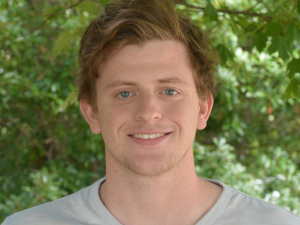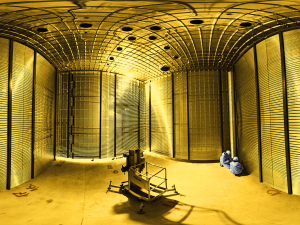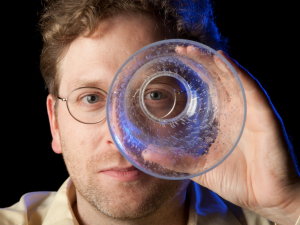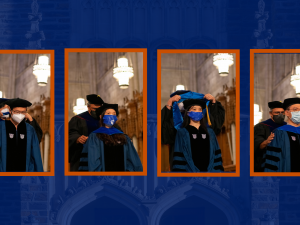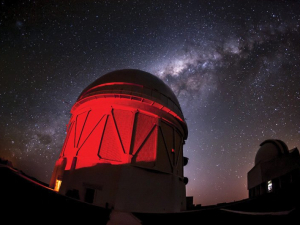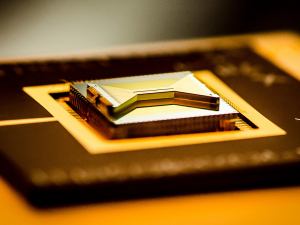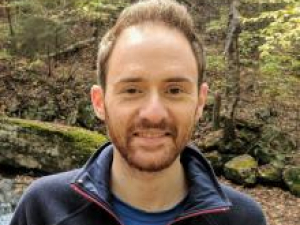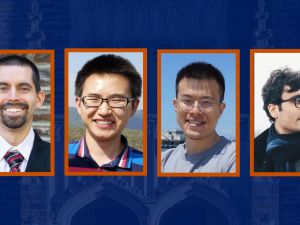Dan Scolnic has a modest goal: understanding the fundamental nature of the Universe. His ambition was recognized this year with a Research Fellowship from the Alfred P. Sloan Foundation. Scolnic, assistant professor of Physics and Trinity’s first Packard Fellow, is a cosmologist. His research seeks to determine the rate at which our Universe is expanding by comparing what we know about the Universe’s compact infancy to the size it has reached now, at the proud age of around 13.5 billion years (a number itself intricately… read more about Meet Trinity’s 2022 Sloan Fellow »
In contrast to classical systems, the state-space for a quantum many-body system grows exponentially in the number of its components. The goal of quantum computation is to exploit this enormous complexity to solve problems that are intractable for our usual classical computers. A decisive resource for quantum information processing is entanglement. Beyond that, measures of entanglement are used to understand and quantify the complexity of quantum matter. Entanglement in ground states -- the lowest energy states that the… read more about Eigenstate entanglement in quantum matter follows crossover scaling functions »
DURHAM, N.C. – Remember flip-phones? Our smartphones may one day look just as obsolete thanks to spintronics, an incipient field of research promising to revolutionize the way our electronic devices send and receive signals. In most current technologies, data is encoded as a zero or a one, depending on the number of electrons that reach a capacitor. With spintronics, data is also transferred according to the direction in which these electrons spin. In a new study appearing this week in the Proceedings of the National… read more about New Super-Conducting Technology Takes Data Beyond Zeroes and Ones »
Congratulations to Ph.D. student Son Nguyen, who will be part of the 2022 cohort of Teaching on Purpose Fellows! The Teaching on Purpose Fellowship, awarded by the Kenan Institute for Ethics, is a fellowship program that prepares doctoral students as educators who are committed to helping today’s undergraduates lead lives of meaning and purpose. Through the Spring semester, fellows will meet with other doctoral students and faculty in weekly sessions to explore what it means to be a good teacher of undergraduates and to… read more about Ph.D. Student Son Nguyen Awarded Teaching on Purpose Fellowship »
Two Duke University seniors are among the 41 recipients of the prestigious Marshall Scholarship, the program announced Monday. Yasa Baig of Foxborough, Massachusetts, and James Marek of Yardley, Pennsylvania, have been chosen from applicants throughout the country. Approximately 40 Marshall Scholarships are awarded each year to high-achieving American students to pursue post-graduate studies at any university in the UK in any field. The award covers all university fees, cost-of-living expenses and many other… read more about Two Duke Seniors Join 2022 Marshall Scholars for Graduate Study in the United Kingdom »
Andrew Smith is one of nine recipients of the Jefferson Science Associates (JSA) graduate fellowships to doctoral students for the 2021-2022 academic year. The fellowship will support Smith's advanced studies at Duke and research at the U.S. Department of Energy’s Thomas Jefferson National Accelerator Facility. Jefferson Lab is a nuclear physics research laboratory managed and operated by JSA, a joint venture between SURA and PAE. Smith, who is advised by Haiyan Gao, is a repeat winner, and has just completed the 2020-2021… read more about Ph.D. student Andrew Smith receives Jefferson Science Associates Graduate Fellowship »
Something hits a gigantic underground tank, flashes dimly for a few seconds and you have 15 minutes to figure out where it came from. The catch? It could have come from anywhere in the universe. We’re talking about neutrinos, the lesser-known cousin of protons and electrons, and how scientists can use them to detect a supernova, the spectacularly explosive (and very rare) death of a star. Thanks to a newly funded National Science Foundation Institute, Kate Scholberg, Arts & Sciences Distinguished Professor of Physics… read more about Physics Professor Joins $15 million NSF Institute to Develop Accelerated AI-Driven Algorithms »
Congratulations to Dr. Jungsang Kim, Professor of Electrical and Computer Engineering and Professor of Physics, and to Dr. Patrick Charbonneau, Professor of Chemistry and Professor of Physics, who were just named fellows of the American Physics Society. Kim was nominated for pioneering contributions to the research, development, invention, and entrepreneurship in trapped ion-based quantum computing, large-scale optical switches, and gigapixel-scale cameras. Charbonneau was nominated for his… read more about Patrick Charbonneau and Jungsang Kim named APS fellows »
The coronavirus pandemic upended many academic traditions, including graduation and hooding ceremonies. Our Ph.D. students, however, remained brilliant, determined, and productive. Twenty-five of our students obtained their Ph.D. degree since March 2020. You'll find their names, their advisors, and their dissertations' titles below: Summer 2020 Doctor of Philosophy in Physics Graduates: Dr. Christian Moritz Binder: [Advisor: Thomas Barthel] – Novel Tensor Network Methods for… read more about Congratulations to our 2020 - 2021 Ph.D.s! »
The New York Stock Exchange welcomes executives and guests of IonQ (NYSE: IONQ) in celebration of becoming the first publicly traded pure-play quantum computing company. To honor the occasion, Peter Chapman, President & CEO, will ring The Opening Bell®. At his sides are Professors Christopher Monroe and Jungsang Kim, IonQ's founders. read more about IonQ Opens for Public Trade »
Imagine taking a snapshot of the Big Bang with a computer chip. Ashutosh Kotwal, Fritz London Professor of Physics at Duke University, thinks we may have a first step in that direction. In a paper published last week in the journal Nature Scientific Reports, Kotwal melds two fascinating ideas from technology and physics - the use of artificial intelligence and machine learning for image recognition and the search for dark matter, the mysterious stuff that makes up 84% of the total amount of matter in the universe.… read more about Capturing secrets of the Universe on a silicon chip »
When a lab is shut down, something big has ended. A cycle of activity has ceased. Some cycles end abruptly while others reach slow and carefully-orchestrated conclusions. In the case of the Behringer Lab, both types of endings were simultaneously true. On July 10, 2018, Duke lowered its flags to mark the passing of Robert Behringer, James B. Duke Professor of Physics. Behringer was an active researcher, with a lab full of graduate students and postdoctoral researchers. Three years later, the last of his graduate students,… read more about Closing the Door on the Behringer Lab »

